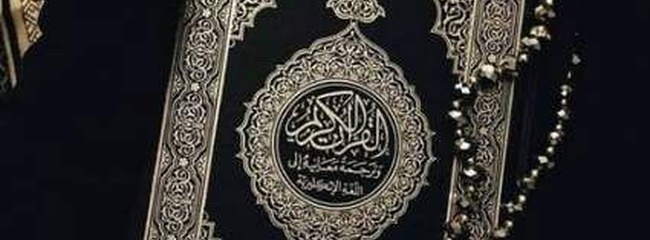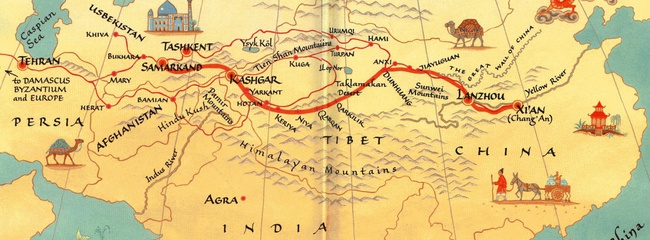In a narration recorded by Imam Tirmidhi, Prophet Muhammad ﷺ is reported to have said "When three come out, "no good will it do to a person to believe then, if he believed not before, nor earned good (by performing deeds of righteousness) through his faith" (Al Quran 6:158): the Dajjaal, the Beast, and the rising of the sun from the West — or from its Maghrib (its place of setting)."[1] - The Prophet ﷺ would recite Ayat 6:158 of Surah Al Anam when mentioning some of the 10 major signs of Akhir Uz Zaman (Last Age) like: Dajjal, Dabbatul Ard (Creature of the Earth), Sunrise from the west, Dukhaan (Smoke), Gog and Magog, etc. This ayat explains why is it important to understand the last age and how changes in the world will impact a believer's Imaan (faith) when signs of the last age begin to appear:
(Al Quran 6:158) Do they then wait for anything other than that the angels should come to them, or that your Lord should come, or that some of the Signs of your Lord (dajjal, dabbatul ard, sunrise from West) should come! The day that some of the signs of your Lord do come, no good will it do to a person to believe then, if he believed not before (appearance of the signs), nor earned good (by performing deeds of righteousness) through his faith.
The ayat teaches that Allah ﷻ and His angels are hidden from us in al ghayb (the unseen) and will appear on the Day of Resurrection. When Allah ﷻ and His Angels appear on that day everyone will eventually believe but what will faith be of use then? Therefore believing in ghayb is part of Imaan (faith) in Islam and to make use of Imaan it is absolute essential to perform righteous actions such as fard (obligatory) and nawafil (voluntary) ones. And so not only belief in ghayb is essential for one's faith but utilizing that faith is also very essential just as a scholar said "faith without good works is equivalent to having no faith at all." The ayat further warns that when major signs of the last age announcing the judgment day begin to appear, then the world will experience changes that will cause the performance of deeds extremely difficult impacting our ability to make use of our faith. In fact with appearance of these signs many will believe, will actually want to practice faith, but the global changes that will follow these signs will cause severe challenges for them to perform good, and this is the meaning of: "no good will it do to believe if he believed not before (appearance of these signs), nor earned good (by performing deeds of righteousness) through his faith". This is exactly what we're experiencing at this point as we move forward in time especially after the outbreak of COVID-19.
Time is passing by extremely fast depriving it of the blessings which our ancestors enjoyed. They had plenty of time to do ibaadat and good. The outbreak of virus has impacted all 5 pillars of Islam. Umrah and Hajj, two pillars that are absolutely essential for a Muslim to perform at least once in a lifetime, were cancelled for all Muslims. Five times salah, an essential pillar including jumah remained suspended for masajids around the world including the 2 holy masjids. This deprived the worshipers of praying in jamaat that is several times blessed than individual prayer. Even during Ramadaan, also an essential Islamic pillar, Muslims from around the world are restricted from Makkah and Madinah while prior to outbreak the number of pilgrims in Ramadaan were almost like Hajj. Restrictions such as limited worshiper attendance, no aftaars, cancellation of events and gathering has deprived communities from physical interactions that provided opportunities to do charitable deeds. With lockdowns in several cities around the world, it has become almost impossible to meet and greet loves one's which has also deprived the believers of family relations. The global pandemic hit economies worldwide skyrocketing inflation in several countries of the developing world, eroding the spending power of masses depriving them to spend money as charity. Many madrassahs, masajids and houses of worship and charity foundations are not receiving funds as they did prior to the outbreak. Hence, our overall ability to do good which helps to make use of our faith will be of no benefit with the appearance of major signs. This is what Al Quran 6:158 brings our attention to.
It is in this reference that the Prophet ﷺ placed much stress on performance of deeds before personal or socio-environmental conditions make their performance much difficult. He said "Hasten to do good deeds before you are overtaken by one of the seven afflictions." Then (giving a warning) he said, "Are you waiting for poverty which will make you unmindful of devotion, or prosperity which will make you corrupt, or a disease which will disable you, or senility which will make you mentally unstable, or sudden death which will take you all of a sudden, or Ad-Dajjal who is the worst expected, or the Hour; and the Hour will be most grievous and most bitter."[2] - Afflictions like senility, poverty, prosperity are warnings for individual believers while major signs like 'the hour' and 'ad-dajjal' are afflictions for entire Muslim ummah, whose appearance will make performance of deeds difficult with the approach of the Judgment day. And so Al Quran 6:158 teaches that with the approach of the hour and appearance of major signs, overall performance of deeds will become difficult for the believers. This might make some minds question what major sign could COVID-19 be, or is it even a major sign? If yes then which one and if not then why not. If you have read this then please do share your thoughts in comments.
References:
[1] Dimashqi, Al-Hafiz ibn Katheer. Al Nihaya Fi al Fitan Wa al Malahim (Book of the End: Great Trials and Tribulations). pg 128 Riyadh: Maktaba Darussalam.
[2] Riyad as-Salihin 93 - Sunnah.com
About
Zaid Shah
I carry a passion for Researching, Learning & Writing on Various Islamic Topics. To read more of my work You can also visit my personal blog website www.rizqankareem.com. You can also follow me on Instagram: https://www.instagram.com/rizqan_kareem/





